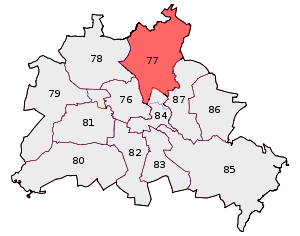Berlin Pankow
Berlin Pankow is one of the 299 single member constituencies used for the German parliament, the Bundestag. Located in north-east Berlin the constituency was created in its current form for the 2002 election. The predecessor constituencies had been won by the Social Democratic Party of Germany in 1990 and by the Party of Democratic Socialism (PDS), the successor party to the East German Communist party, in 1994 and 1998. The redrawn constituency was won by the SPD in 2002 and 2005 but lost to The Left Party (DL) in 2009.

History and boundaries
The constituency, numbered constituency 77 by the German electoral authorities,[1] contains most of the Berlin borough of Pankow. This borough, a merger of the former boroughs of Pankow, Prenzlauer Berg and Weissensee was created by the 2001 administrative reform. The current constituency excludes the eastern section of Prenzlauer Berg, which is placed in the Berlin Friedrichshain-Kreuzberg – Prenzlauer Berg East constituency. The legislation establishing the constituency describes it as containing the "borough of Pankow without the area east of Mitte and Prenzlauer Allee south of the road and mid Lehderstrasse Gürtelstrasse and the Jewish Cemetery."[2]
The first constituency to centre on the Pankow and Weissensee areas, constituency number 258, Berlin Pankow – Hohenschönhausen – Weissensee II, was used for the 1990 election, the first after German reunification. For the 1994 election, the remainder of the Weissensee area was added and the constituency renamed as Berlin Hohenschönhausen – Pankow – Weissensee and numbered constituency 261.

The reduction in the number of single member constituencies from 328 to 299 meant that Berlin lost one of its 13 constituencies for the 2002 election. The boundary changes which took effect for the 2002 election transferred the Hohenschönhausen area to the new Berlin Lichtenberg while the redrawn Pankow constituency gained the western section of Prenzlauer Berg from the abolished Berlin Mitte – Prenzlauer Berg constituency. These boundary changes proved significant as the PDS had won the constituency by just 3,293 votes in 1998[3] and out of the 23 Berlin boroughs then in existence, Hohenschönhausen had produced their fourth highest vote share, 41.4% against the SPD vote of 31.5%. In contrast, in the newly added Prenzlauer Berg section, SPD had led PDS in the Prenzlauer Berg borough as a whole by 38.2% to 34.0%[4] Controversy arose after the Chief German statistician produced figures showing that, on the new 2002 boundaries, the SPD would have beaten the PDS by 36.1% to 32.7% in 1998.[5]
Consequently the newly redrawn constituency was won by the SPD in 2002. Under Germany's electoral system, a party must win either 3 constituency seats or poll more than 5% of the vote across Germany as a whole in order to be awarded list seats. Having won four constituency seats at the previous election, the failure of the PDS to win a third constituency here or in other potential seats such as Berlin Treptow – Köpenick or Berlin Kreuzberg-Friedrichshain – Prenzlauer Berg East in 2002 proved crucial to the overall result as it meant the party missed out on 15 list MPs. In 2009, a large drop in the SPD vote allowed the Left to gain the seat, although the winning percentage was just 28.8%, the second lowest winning percentage of the election after the neighbouring Berlin Mitte constituency.
Profile
The number of residents with German citizenship was 94.0%, a figure above the Berlin average of 86.6% and the third highest figure for any Berlin constituency.[6] 33.5% of residents had qualifications which met the requirements for University entry.
Electoral system
Elections in Germany take place using the Additional Member System. Voters have two votes, one for a constituency MP and one for a regional list to elect representatives for the whole of Berlin city. Elections for the Pankow constituency take place using the first past the post system.
Results
2013 election
| 2013 German federal election: Berlin-Pankow[7] | |||||||||
|---|---|---|---|---|---|---|---|---|---|
| Notes: |
Blue background denotes the winner of the electorate vote.
| ||||||||
| Party | Candidate | Votes | % | ±% | Party votes | % | ±% | ||
| Left | 48,926 | 28.3% | 43,472 | 25.2% | |||||
| CDU | 41,295 | 23.9% | 40,617 | 23.5% | |||||
| SPD | 36,180 | 21.0% | 38,030 | 22.0% | |||||
| Green | 25,442 | 14.7% | 24,300 | 14.1% | |||||
| AfD | 7,088 | 4.1% | 8,372 | 4.8% | |||||
| Pirates | 5,860 | 3.4% | 6,767 | 3.9% | |||||
| NPD | 2,872 | 1.7% | 2,597 | 1.5% | |||||
| PARTEI | 2,220 | 1.3% | 1,984 | 1.1% | |||||
| FDP | 1,581 | 0.9% | 4,380 | 2.5% | |||||
| FW | 861 | 0.5% | 665 | 0.4% | |||||
| BüSo | 322 | 0.2% | 182 | 0.1% | |||||
| pro-Deutschland | 457 | 0.3% | |||||||
| ÖDP | 416 | 0.2% | |||||||
| REP | 231 | 0.1% | |||||||
| MLPD | 146 | 0.1% | |||||||
| PSG | 124 | 0.1% | |||||||
| BIG | 84 | 0.0% | |||||||
| Informal votes | 2,414 | 2,237 | |||||||
| Total Valid votes | 172,647 | 172,824 | |||||||
| Left hold | Majority | 7,631 | 4.4% | ||||||
2009 election
| Party | Constituency results | List results | ||||||
|---|---|---|---|---|---|---|---|---|
| Candidate | Votes | % share | +/- | Votes | % share | +/- | ||
| The Left Party.PDS | Stefan Liebich | 47,053 | 28.8 | +4.5 | 45,087 | 27.5 | +3.2 | |
| Social Democratic Party of Germany | Wolfgang Thierse | 44,732 | 27.4 | -13.7 | 29,795 | 18.2 | -16.4 | |
| Christian Democratic Union | Gottfried Ludewig | 28,332 | 17.4 | +2.0 | 28,179 | 17.2 | +2.9 | |
| Alliance '90/The Greens | Heiko Thomas | 26,770 | 16.4 | +3.6 | 32,505 | 19.9 | +4.1 | |
| Free Democratic Party | Martin Lindner | 9,617 | 5.9 | +2.8 | 13,606 | 8.3 | +2.6 | |
| National Democratic Party of Germany | 3,669 | 2.2 | 0.0 | 2,964 | 1.8 | -0.1 | ||
| Others | 3,062 | 2.0 | N/A | |||||
Out of a total electorate of 232,246, the total number of first votes cast was 166,149 of which 3,081 votes were invalid. The turnout was thus 71.5%, a drop of 6.3% compared to the 2005 election.
source:[8]
2005 election
| Party | Constituency results | List results | ||||||
|---|---|---|---|---|---|---|---|---|
| Candidate | Votes | % share | +/- | Votes | % share | +/- | ||
| Social Democratic Party of Germany | Wolfgang Thierse | 70,730 | 41.1 | -3.6 | 59,613 | 34.6 | -3.2 | |
| The Left Party.PDS | Stefan Liebich | 41,864 | 24.3 | -1.8 | 42,051 | 24.4 | +4.2 | |
| Christian Democratic Union | Günter Nooke | 26,407 | 15.3 | -1.4 | 24,750 | 14.4 | -1.6 | |
| Alliance '90/The Greens | Werner Schulz | 21,946 | 12.8 | +6.3 | 27,181 | 15.8 | -0.4 | |
| Free Democratic Party | 5,241 | 3.0 | -0.6 | 9,839 | 5.7 | 0.8 | ||
| National Democratic Party of Germany | 3,821 | 2.2 | 0.0 | 3,235 | 1.9 | +1.1 | ||
| Others | 2,112 | 1.3 | N/A | |||||
Out of a total electorate of 224,621, the total number of votes cast was 174821 (77.8%) of which 2,700 votes were invalid.
2002 election
| Party | Constituency results | List results | ||||
|---|---|---|---|---|---|---|
| Candidate | Votes | % share | Votes | % share | ||
| Social Democratic Party of Germany | Wolfgang Thierse | 74,948 | 44.7 | |||
| The Left Party.PDS | 43,833 | 26.1 | ||||
| Christian Democratic Union | 28,089 | 16.8 | ||||
| Alliance '90/The Greens | 10,784 | 6.4 | ||||
| Free Democratic Party | 6,172 | 3.7 | ||||
| The Grays – Gray Panthers | 2,019 | 1.2 | ||||
| Others | 1,824 | 1.0 | ||||
Out of a total electorate of 220,153, the total number of votes cast was 169,910 (77.2%) of which 2,241 votes were invalid.
References
- Election results and statistics (in German) Archived October 31, 2007, at the Wayback Machine
- description of constituency boundaries Archived October 11, 2009, at the Wayback Machine
- 1998 Berlin election results, table 3a Archived October 10, 2006, at the Wayback Machine
- 1998 Berlin election results, Endgültiges Ergebnis, in Grafiken, Grafik 8
- Die geschleiften PDS-Hochburgen, Der Spiegel, 16 September 2002
- Constituency data Archived June 16, 2011, at the Wayback Machine
- https://www.bundeswahlleiter.de/en/bundestagswahlen/2013/ergebnisse/bund-99/land-11/wahlkreis-76.html
- "Federal returning officer 2009 results". Archived from the original on 2009-10-11. Retrieved 2009-10-01.